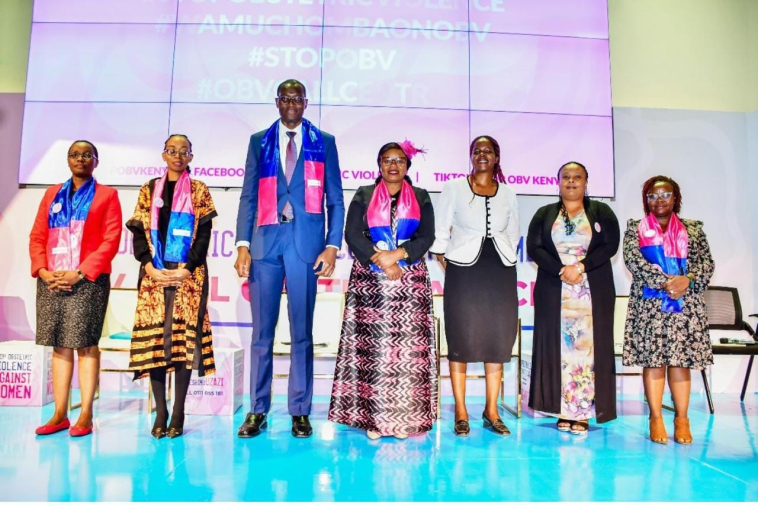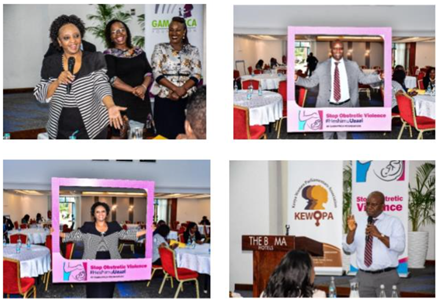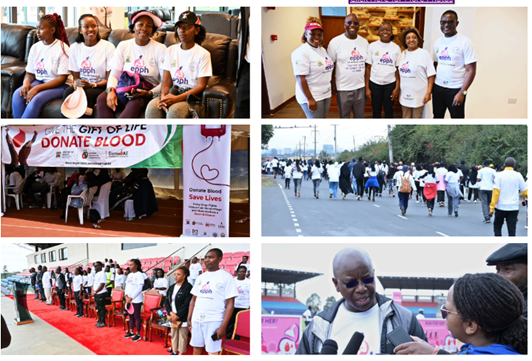Transforming maternal healthcare: how KOGS is leading the way on gender equality
Six lessons learned from Kenya Obstetrical and Gynaecological Society's (KOGS) work to integrate gender equality and leadership into clinical practices.

Over the last three years, KOGS has been leading a gender-transformative approach to maternal healthcare. This initiative offers insights for healthcare systems worldwide faced with persistent inequities in maternal health outcomes.
KOGS’s work as part of the FIGO’s Leadership Development Initiative: Removing barriers to effective access and coverage of maternal healthcare (LDI: REACH), was designed to strengthen gender-transformative leadership and improve clinical quality through professional obstetrics and gynaecology (OBGYNs) societies, such as KOGS.
Why gender equality matters in Kenya's healthcare
Kenya's maternal mortality ratio of 355 deaths per 100,000 live births[1] is significantly higher than the global average of 197 deaths per 100,000 live births[2]. Kenya follows a trend that we see across most countries today: globally, the health sector workforce sees merely 25% of senior leadership positions held by women, despite women comprising most healthcare workers in nursing and midwifery roles.[3]This gendered and vertical segregation of leadership has profound implications for maternal health outcomes.
Kenya has about 76,000 registered nurse midwives accounting for about 72% of the health workforce.[4] However, the voices of this workforce, who are predominantly women and understand the day-to-day realities of maternal care, are often absent from decision-making. In simpler terms: women’s health is being delivered by women, but led by men.
When women leaders are excluded from decision-making, their unique perspectives and experiences are lost. Cultural barriers and systemic inequities create gaps in both access and quality of care. KOGS recognised that addressing these challenges required more than clinical interventions: it requires a fundamental remapping of how gender shapes healthcare systems.
Six Lessons from KOGS
1. Ground programming in evidence and data
KOGS conducted a gender analysis to uncover specific barriers and trends in maternal healthcare. Through this approach, they identified three key trends.
Firstly, societal and cultural shifts are influencing a softening of traditional gender roles in Kenya, with women increasingly completing education and transitioning to economic independence.
Secondly, traditional gendered notions of leadership qualities and potential could be holding women back from taking up leadership positions.
Thirdly, competing domestic and professional commitments present a challenge for some women physicians. Women doctors indicate that more flexibility and accommodation at work, particularly around maternity leave and early years’ childcare, could be beneficial for retention, advancement and wellbeing.
These evidence-based insights directly informed programme design, ensuring interventions were targeted, effective and responsive to gaps.
What we learned: gender analysis is essential for deconstructing pre-conceived assumptions and designing effective and equitable health interventions.
2. Invest in leadership development for women healthcare workers
KOGS participated in a FIGO-led 10-week Leadership Empowerment Series training for healthcare professionals to improve communication, advocacy, gender and leadership skills. The training increased women healthcare professionals’ visibility and voice in decision-making spaces, directly contributing to more gender-responsive service delivery.
"It has given me the confidence to be able to engage and share my knowledge… I feel like it has empowered me and made me stronger and of course more confident to speak about my mind without fear"
– Leadership Empowerment Series participant
"I think I'm a better advocate now. I'm better able to articulate issues and try and maybe push for some changes."
– Leadership Empowerment Series participant
Building on this training, Eunice Atsali from the Maternity Association of Kenya (MAK) integrated these principles into mentor-mentee EMONC training sessions. This strengthened the program’s focus on equity and inclusivity and demonstrated the wider ripple effects that tailored leadership support can have across healthcare.
What we learned: tailored leadership training builds confidence and power among frontline women healthcare providers, helping them influence health systems from within.
3. Apply a gender lens across programme activities
Instead of addressing gender as a stand-alone issue, KOGS focused on mainstreaming gender into current ways of working. By engaging on conversations about gender and power in professional settings, KOGS helped normalised discussions about gender equity.
Looking ahead, KOGS also plans to develop a male engagement and inclusion strategy, recognising that men often serve as gatekeepers in both health systems and households. This approach acknowledges that sustainable change requires engaging all stakeholders, including those who may traditionally hold power in decision-making processes. Rather than viewing men as barriers, KOGS sees them as key partners in transformation.
What we learned: applying a gender lens helped normalise conversations about gender and power, helping shift workplace culture, and engage other stakeholders as partners.
4. Foster peer networks, shared learning and collective action
Through FIGO's LDI Voices peer network for women healthcare providers, women leaders from six countries, including Kenya, were given a platform for learning, mentoring, and mutual support. By fostering a safe and collaborative space, the network enabled members to explore gender equity challenges, share strategies, and grow stronger together. The experience highlighted the value of peer learning, including across borders. The network's emotional impact was equally powerful.
"Collaboration is actually very key, especially, you know, inter-professional collaboration"
– KOGS and LDI Voices participant
Women in health are coming out strongly to voice out their concerns, talk about their experiences, and also to encourage others just to know that you are not alone in this.
– KOGS and LDI Voices participant
The LDI Voices network has evolved into something far greater than a professional community: it represents a movement for transformation that transcends borders and institutions.
"Learning is a continuous process… to be a leader in healthcare as a woman, you have to keep on learning and also changing how you look at things so often."
– KOGS and LDI Voices participant
What we learned: investing in women's leadership, creating supportive networks and systematically addressing gender inequities is key to improving both healthcare outcomes and health systems.
5. Leverage policy advocacy to institutionalise gender equity
Working closely with the Kenya Women Parliamentary Association (KEWOPA), KOGS contributed to the conversation requiring political candidates to select running mates of the opposite gender and the need to pass the gender principle law. KOGS and KEWOPA also co-hosted a workshop to raise awareness about obstetric violence and devise strategies to combat it in Kenya. By bringing together key stakeholders, experts and organisations, the workshop participants united around a shared determination to end obstetric violence and ensure the dignity and well-being of women during pregnancy and childbirth. Through her powerful presentation, Professor Anne-Beatrice Kihara made it clear that any endeavour to combat obstetric violence must place gender considerations at the forefront. Gender-transformative policies and programs are essential to addressing the unique challenges that women face during pregnancy and childbirth.

Further, KOGS embedded gender equity across all focus areas of their 2025 Strategic Plan, including sexual and reproductive health and rights (SRHR) advocacy, leadership development, mentorship, and community engagement. This comprehensive approach ensures that gender considerations are a fundamental key principle, not just an afterthought.
What we learned: embedding gender equity into national policy and strategic plans ensures sustainability and system-wide impact.
6. Engage communities to campaign and deliver quality care
Recognising that transformation requires community involvement, KOGS organised impactful public events to help raise awareness and mobilise the public. These activities brought together healthcare providers, media, and the public to raise awareness about maternal mortality and advocate for better care.
For example, on 6 October 2024, KOGS, in partnership with the University of Nairobi, proudly hosted the world’s first End Postpartum Haemorrhage (PPH) Run at the Ulinzi Sports Complex in Langata. The initiative specifically addressed the "three delays" in seeking, reaching and receiving care that contribute to preventable maternal deaths. This event brought together influential leaders, health advocates and hundreds of participants united by one goal: to end PPH and save women’s lives. By engaging communities as partners rather than passive recipients, KOGS empowered them to become active participants in improving healthcare access and quality.

What we learned: Collective action, through communities, healthcare providers, and policymakers, helps raise awareness and creates momentum for systemic improvements in maternal health.
The path forward: building on success
KOGS’s experience demonstrates that integrating gender equality into healthcare requires a multi-level approach: developing women's leadership, reforming policies, engaging communities and shifting social norms. The partnership between FIGO and KOGS through the LDI:REACH programme showcases how bold, gender-transformative strategies can lead to sustainable improvements in maternal health outcomes and women's empowerment.
The LDI Reach programme has built a foundation of expertise in gender and leadership, creating a stronger, more resilient and empowered workforce to address maternal mortality challenges in the future. As this transformative work continues, it serves as both inspiration and practical guide for those committed to building more equitable healthcare systems.
The lessons from Kenya remind us that change is possible when we have the courage to challenge existing systems and the commitment to build something better. These lessons can help us move towards health systems that are not only delivered by women, but also led by women.
[1] https://kenya.unfpa.org/en/topics/maternal-health-and-hiv
[2] https://www.unfpa.org/sites/default/files/pub-pdf/9789240108462-eng.pdf
[3] https://www.who.int/publications/i/item/9789240025905
[4] https://www.health.go.ke/wp-content/uploads/2020/11/Kenya-Health-Sector…